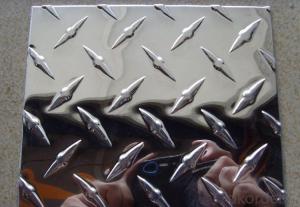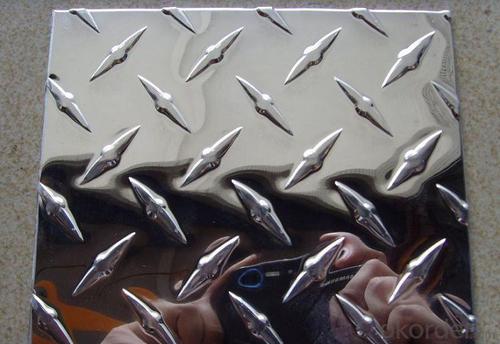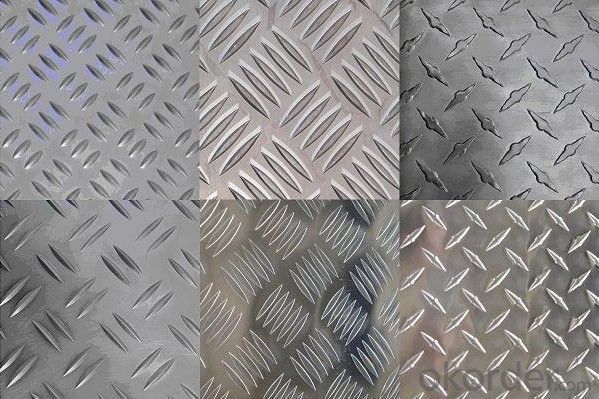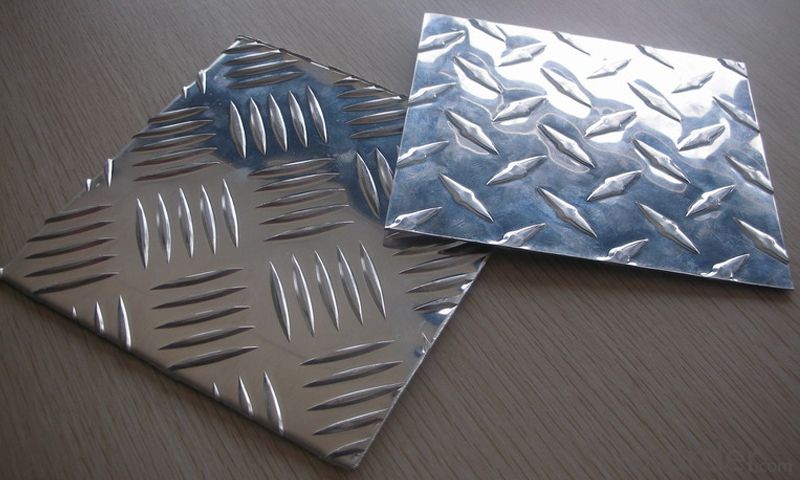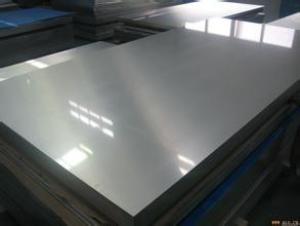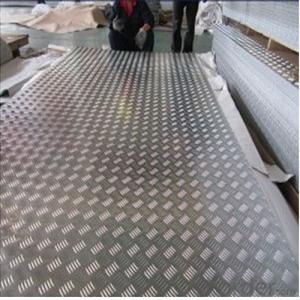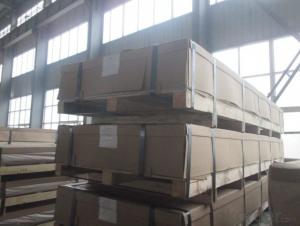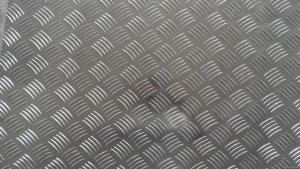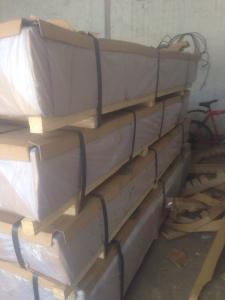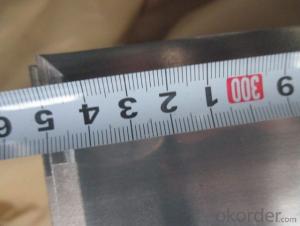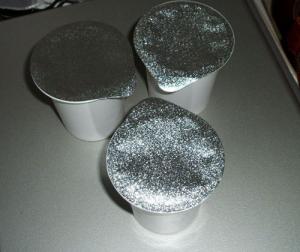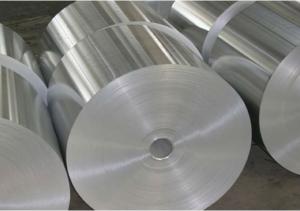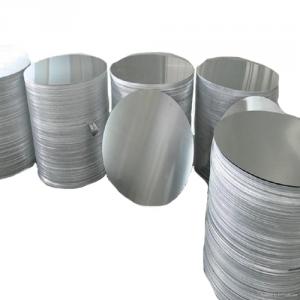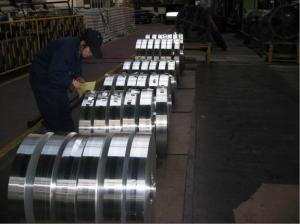High Quality Aluminum Diamond Plate Sheets - Factory Manufactured at Low Prices
- Loading Port:
- Shanghai
- Payment Terms:
- TT OR LC
- Min Order Qty:
- 5 m.t.
- Supply Capability:
- 5000 m.t./month
OKorder Service Pledge
OKorder Financial Service
You Might Also Like
lProduct Description:
a.Available Thickness:
Tread Plate Alloy | Baseboard thickness | Thickness of the pattern |
| 1xxx series | 1.0-1.5mm | 0.3-0.5mm |
| 1.5-5.0mm | 0.6-1.3mm | |
| 2xxx series | 1.2-1.5mm | 0.3-0.5mm |
| 1.5-5.0mm | 0.6-1.2mm | |
| 3xxx series | 1.5-2.0mm | 0.6-1.0mm |
| 2.0-4.5mm | 0.8-1.2mm |
b.Mechanical Properties:
| Five bar tread plate | Bend | Tensile strength(Mpa) | Elongation(%) |
| 3003 H114 | 1/2 closed | 164-170 | 13-13.5 |
c.Chemical Composition:
| Five bar 3003H114 | Si(%) | Fe(%) | Cu(%) | Mg(%) | Cr(%) | Mn(%) | Zn(%) | Ti(%) | Al(%) | Standard |
| Min | 0.145 | 0.464 | 0.058 | <0.03< span=""> | <0.005< span=""> | 1.081 | <0.03< span=""> | 0.0346 | else | GB/T3880-2006 |
| Max | 0.159 | 0.476 | 0.076 | 1.099 | 0.0357 |
l Packaging & Delivery
Packaging detail: First, plastic cloth; Second, Pearl Wool ; Third, wooden cases with dry agent ,without fumigation, wooden pallets
Delivery detail: Within 25days
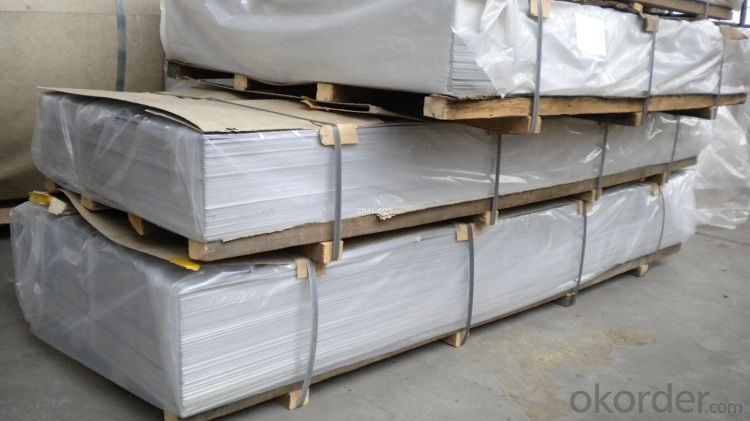
l Company Profile
CNBM International Corporation, China National Building Materials (Group) Corporation, is one of the largest companies in China building material & equipment industry, with 42,800 employees and sales in 2005 of US Dollar 4.395 billion. In 2006, China National Building Material Company Limited was listed on Hong Kong Stock Market with the stock code as 3323.
The business scope of CNBM covers from manufacturing and sales of a series of building materials to scientific research and design, import and export trade. In many of these fields, CNBM is playing the leading role.
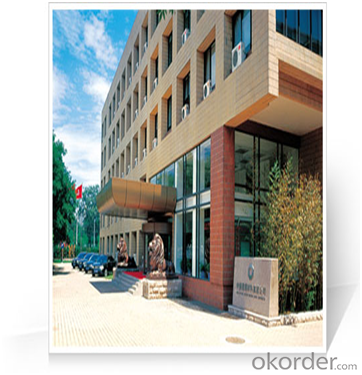
l Product Images and Application

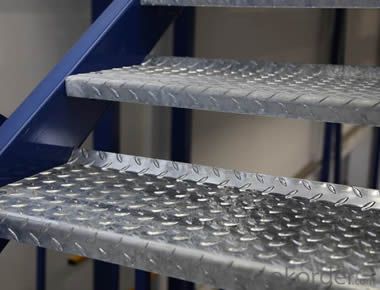
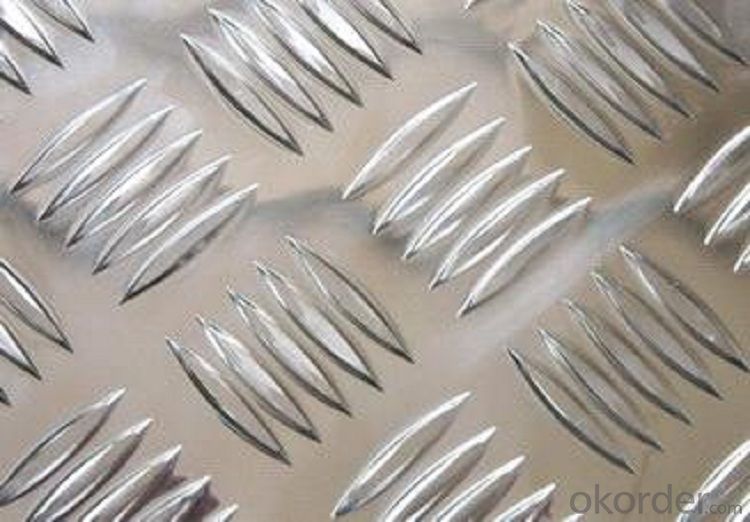
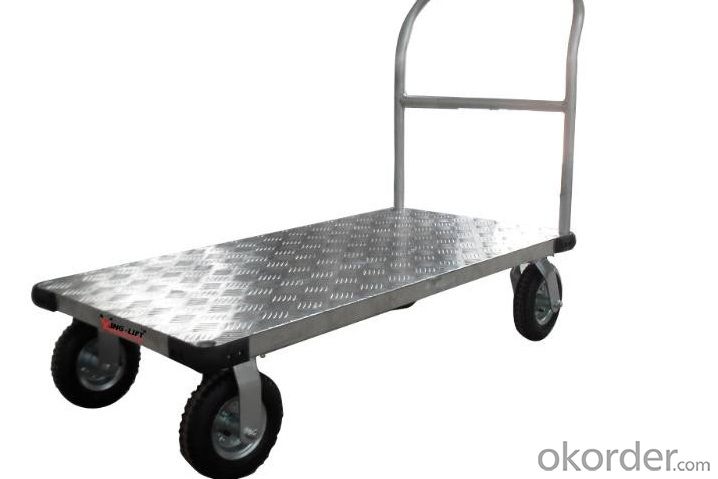
l FAQ
Q: Do you provide free samples?
A: Yes, free samples will be sent to you on freight at destination.
Q: Can I get your latest products catalogue?
A: Yes, it will be sent to you in no time.
Q: What is the MOQ?
A: 5 tons
Q: What are your payment terms?
A: We accept L/C, T/T.
l Contact Us
Name: Amanda Qian
Email: amandaqian@okorder.com
- Q: This question asks for a description of the characteristics that are inherent to pure aluminum.
- <p>Pure aluminum is a lightweight, silvery-white metal known for its excellent malleability, ductility, and electrical conductivity. It has a density of 2.7 g/cm鲁, which is about one-third that of steel. It is non-magnetic and has a low melting point of 660掳C (1220掳F). Pure aluminum is also highly reflective, making it useful in mirrors and reflective coatings. It is a good thermal conductor and is resistant to corrosion due to the formation of a protective oxide layer on its surface. However, it is soft and lacks strength, which is why it is often alloyed with other elements to improve its mechanical properties.</p>
- Q: Explain the connection between aluminum and its interaction with electromagnetic radiation.
- <p>Aluminum has a unique relationship with electromagnetic radiation due to its reflective and conductive properties. It is a good reflector of visible light and infrared radiation, which is why it is used in applications such as mirrors and reflective coatings on windows to reduce heat transfer. Additionally, aluminum's high electrical conductivity makes it an excellent shield against electromagnetic radiation, as it can absorb and reflect a significant amount of electromagnetic waves. This property is utilized in various industries, including electronics and aerospace, to protect sensitive equipment from electromagnetic interference.</p>
- Q: Explain how aluminum production and use contribute to global warming.
- <p>Aluminum production contributes to global warming through the emission of greenhouse gases, primarily carbon dioxide. The process of smelting aluminum from bauxite ore is energy-intensive, often relying on fossil fuels, which release CO2. Additionally, aluminum production generates perfluorocarbons (PFCs), potent greenhouse gases. The use of aluminum in various industries and products also has an indirect impact, as it drives demand for energy and resources. Furthermore, aluminum's longevity in landfills means it doesn't decompose, contributing to waste issues and indirectly affecting global warming through methane emissions from landfills.</p>
- Q: What are the positive environmental impacts of utilizing recycled aluminum over newly produced aluminum?
- <p>Using recycled aluminum has several environmental benefits. It conserves natural resources by reducing the need for bauxite mining, which is the primary source of aluminum. Recycling aluminum requires significantly less energy compared to producing new aluminum from raw materials, which can lead to a substantial reduction in greenhouse gas emissions. Additionally, recycling aluminum helps in reducing landfill waste, as it diverts used aluminum products from landfills. Moreover, it decreases the environmental impact associated with the production process, such as water pollution and habitat destruction. Overall, recycling aluminum is a more sustainable practice that contributes to a lower carbon footprint and a healthier environment.</p>
- Q: This question asks for an overview of the methods used to produce aluminum items.
- <p>Aluminum products are manufactured through several key processes. First, aluminum ore, typically bauxite, is mined and then processed to extract alumina (aluminum oxide). This is done through the Bayer Process, where bauxite is dissolved in caustic soda and heated, followed by precipitation of alumina. The next step is smelting, where alumina is reduced to aluminum metal using the Hall-H茅roult process, involving the electrolysis of molten alumina in a cryolite bath. Once aluminum is obtained, it can be cast into various shapes or forms. Further manufacturing processes include extrusion, forging, rolling, and machining to create specific aluminum products such as sheets, rods, or complex components. These processes can be followed by surface treatments like anodizing, painting, or coating to enhance the product's properties or appearance.</p>
- Q: What are the potential dangers of utilizing high-purity aluminum powders in industrial settings?
- <p>Yes, there are risks associated with using high-purity aluminum powders in manufacturing processes. These powders can be highly reactive, especially when in fine particle form, and pose a risk of dust explosions if they come into contact with an ignition source. Additionally, aluminum dust can be a respiratory hazard, potentially causing health issues if inhaled. Proper handling, storage, and safety measures are crucial to mitigate these risks.</p>
- Q: Explain the economic and job market implications of using aluminum.
- <p>The use of aluminum has significant impacts on the economy and job market. It is a key material in various industries, including construction, automotive, aerospace, and consumer goods, which drives demand and economic growth. Aluminum production and processing create jobs directly in mining, refining, and manufacturing sectors, and indirectly in related services and supply chains. Additionally, its lightweight and corrosion-resistant properties make it valuable for energy-efficient transportation, contributing to environmental sustainability and opening new job opportunities in green technologies. However, it also presents challenges such as the need for energy-intensive production processes and the management of waste, which require innovative solutions and can lead to job creation in recycling and environmental management.</p>
- Q: This question asks for methods to prevent the corrosion of pure aluminum when exposed to environmental factors.
- <p>To prevent corrosion of pure aluminum in the environment, one can apply protective coatings such as paints or anodizing, which forms a dense oxide layer on the surface. Additionally, using aluminum alloys that contain elements like copper, magnesium, and silicon can enhance resistance to corrosion. Regular cleaning and maintenance to remove contaminants that may initiate corrosion are also important. In extreme environments, cathodic protection or the use of inhibitors can be employed to further protect aluminum from corrosion.</p>
- Q: Explain the different methods used for recycling aluminum.
- <p>Aluminum recycling methods primarily include mechanical recycling and re-melting. Mechanical recycling involves cleaning, shredding, and sorting aluminum waste before reprocessing it into new products. Re-melting involves melting aluminum scrap and then casting it into new aluminum products. This process is energy-efficient, as it requires only 5% of the energy needed to produce aluminum from raw materials. Additionally, aluminum can be recycled indefinitely without losing its properties, making it one of the most recyclable materials.</p>
- Q: Describe the steps involved in the production of aluminum sheets.
- <p>The production process of aluminum sheets involves several key steps. Initially, raw materials, primarily bauxite, are mined and then refined to produce aluminum oxide. This aluminum oxide is then reduced to aluminum metal through the Hall-H茅roult process, where it is dissolved in molten cryolite and electrolyzed. Once the aluminum is produced, it is heated and cast into large ingots. These ingots are then hot or cold rolled into sheets, which are progressively reduced in thickness. The sheets may undergo further processing such as annealing to improve ductility or coating for specific applications. Quality control checks are performed throughout the process to ensure the sheets meet the required specifications. The final product is then cut to size and packaged for distribution to various industries.</p>
Send your message to us
High Quality Aluminum Diamond Plate Sheets - Factory Manufactured at Low Prices
- Loading Port:
- Shanghai
- Payment Terms:
- TT OR LC
- Min Order Qty:
- 5 m.t.
- Supply Capability:
- 5000 m.t./month
OKorder Service Pledge
OKorder Financial Service
Similar products
Hot products
Hot Searches
Related keywords
